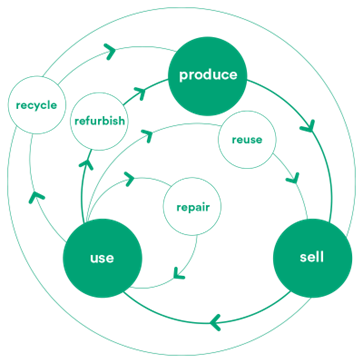The circular economy is a model of production and consumption, which involves sharing, leasing, reusing, repairing, refurbishing and recycling existing materials and products as long as possible. In this way, the life cycle of products is extended.
According to the World Economic Forum, a circular economy is “an industrial system that is restorative or regenerative by intention and design.”
The European Parliament emphasizes that unlike the traditional linear economic model based on the principles of “take-make-consume-throw away”, a circular economy is based on an (almost) closed cycle where products and the materials they contain are highly valued. In practice, this means minimizing waste.
When a product reaches the end of its lifecycle, its materials are kept within the economy, where possible through recycling. These materials can be used productively again and again, thus creating added value.
A common misunderstanding minimizes the definition of circular economy to the familiar reduce-reuse-recycle approach. Recycling alone will not save us.” Circular economy is a “bigger idea” — a significant restructuring that forces us to rethink how we’ve done things since the rise of the first steam engine.
Our current industrial economy is dominated by linear processes.

A circular economy works quite differently. It closes the loop on the linear pattern by retaining the highest utility and value of products, components, and materials for as long as possible. With circular economic activity, waste is reduced to a minimum because everything produced is transferred and used somewhere else, continuously.

Moving towards a more circular economy can bring opportunities including reduced environmental impact; greater supply chain security; increased competitiveness; innovation; growth; and job creation. However, the transition also poses challenges such as financing; skills; consumer behavior and business models; and governance at multiple levels.
Source:




No responses yet